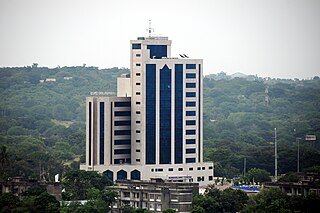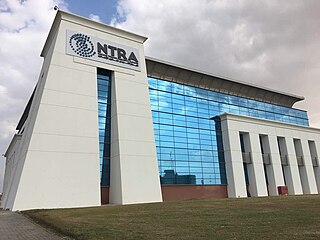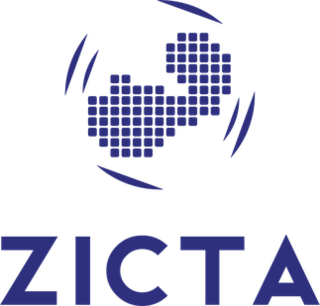Related Research Articles
Local loop unbundling is the regulatory process of allowing multiple telecommunications operators to use connections from the telephone exchange to the customer's premises. The physical wire connection between the local exchange and the customer is known as a "local loop", and is owned by the incumbent local exchange carrier. To increase competition, other providers are granted unbundled access.
Telecommunications had an early beginning in Mauritius, with the first telephone line installed in 1883, seven years after the invention of the telephone. Over the years, the network and telephony improved. By the late 20th century, the rapid development and convergence of information and telecommunications technologies gave rise to an ICT industry on the island along with many incentives provided by the government. The government thus aims to make the ICT sector the 5th pillar of the Mauritian economy and Mauritius a Cyber Island. Historically, the country is known for tourism, rather than its call centers and business process outsourcing.
Telecommunications in the Philippines are well-developed due to the presence of modern infrastructure facilities. The industry was deregulated in 1995 when President Fidel Ramos signed Republic Act No. 7925. This law opened the sector to more private players and improved the provision of telecom services are better and fairer rates, leading to the creation of many telecommunication service providers for mobile, fixed-line, Internet and other services.

Communications in Somalia encompasses the communications services and capacity of Somalia. Telecommunications, internet, radio, print, television and postal services in the nation are largely concentrated in the private sector. Several of the telecom firms have begun expanding their activities abroad. The federal government operates two official radio and television networks, which exist alongside a number of private and foreign stations. Print media in the country is also progressively giving way to news radio stations and online portals, as internet connectivity and access increases. In 2012, a National Communications Act was also approved by Cabinet members, and 2 October 2017, the president of Somalia Finally signed the National Communications Law, and became the official Law that regulated the ICT industry. Under that Law, National Communications Authority (NCA) of the federal Republic of Somalia has been established, with board of directors and a general manager. Somalia currently is ranked first in Africa for most affordable mobile data per gigabyte and 7th in the world.
Modern telecommunications in Thailand began in 1875 with the deployment of the first telegraph service. Historically, the development of telecommunication networks in Thailand were in the hands of the public sector. Government organisations were established to provide telegraph, telephone, radio, and television services, and other government agencies, especially the military, still control a large estate of radio and television spectra. Private telecommunication operators initially acquired concession agreements with state enterprises. For mobile phone services, all the concessions have been amended by successive government to last 25 years have gradually ended in 2015. For other services, the concession terms and conditions vary, ranging from one to fifteen years. Nearly all of the concessions are build-operate-transfer (BTO) contracts. The private investor has to build all the required facilities and transfer them to the state before they can operate or offer services to public.
The liberalization of Bangladesh's telecommunications sector began with small steps in 1989 with the issuance of a license to a private operator for the provision of inter alia cellular mobile services to compete with Bangladesh Telegraph and Telephone Board (BTTB), the previous monopoly provider of telecommunications services within Bangladesh. Significant changes in the number of fixed and mobile services deployed in Bangladesh occurred in the late 1990s and the number of services in operation has subsequently grown exponentially in the past five years.
A mobile virtual network operator (MVNO) is a wireless communications services provider that does not own the wireless network infrastructure over which it provides services to its customers. An MVNO enters into a business agreement with a mobile network operator to obtain bulk access to network services at wholesale rates, then sets retail prices independently. An MVNO may use its own customer service, billing support systems, marketing, and sales personnel, or it could employ the services of a mobile virtual network enabler (MVNE).
The African Telecommunications Union (ATU) is an organization in Africa that combines countries and mobile telecommunications providers in an attempt to dramatically increase development of the continent's information and communication technology (ICT) infrastructure.

The GSM Association is a lobby organisation that represents the interests of mobile network operators worldwide. More than 750 mobile operators are full GSMA members and a further 400 companies in the broader mobile ecosystem are associate members. The GSMA represents its members via industry programmes, working groups and industry advocacy initiatives.
The Communications Authority of Kenya (CA) is the independent regulatory agency for the ICT industry in Kenya with responsibilities in telecommunications, e-commerce, broadcasting,cyber security, and postal/courier services. The CA is also responsible for managing the country's numbering and frequency spectrum resources, administering the Universal Service Fund (USF) as well as safeguarding the interests of users of ICT services.

The Body of European Regulators for Electronic Communications (BEREC) is the body in which the regulators of the telecommunications markets in the European Union work together. Other participants are the representatives of the European Commission, as well as telecommunication regulators from the member states of the EEA and of states that are in the process of joining the EU.
Botswana Telecommunications Authority (BTA) is a dissolved independent commission that was responsible for regulating all matters related to telecommunications, postal services of Botswana and has been succeeded by Botswana Communications Regulatory Authority. The Minister appoints all five board members, who serve on a part-time basis. The BTA is mandated to promote the development and provision of efficient telecommunications and broadcasting services in Botswana, under the terms of the Telecommunications Act 15 of 1996. There have been legal disputes between the BTA and licensed operators, springing from issues related to interconnection and pricing.

The Information and Communication Technologies Authority (ICTA), is a national telecommunications regulatory and inspection authority of Turkey. It was formerly known as the Telecommunications Authority.

The Tanzania Communications Regulatory Authority (TCRA), established by the TCRA Act No. 12 of 2003, is an independent Authority for the postal, broadcasting and electronic communications industries in the United Republic of Tanzania based in Mikocheni ward of Kinondoni District of Dar es Salaam Region. It merged the former Tanzania Communications Commission and the Tanzania Broadcasting Commission. The TCRA is accountable to the Communications and Technology Ministry. The Information Communication and Technology (ICT) sector reform in Tanzania is notable in that development was influenced by regional, political (national) and technological factors. Tanzania is one of the few African countries to liberalise the communications sector whereby the Converged Licensing Framework (CLF) is used as a key strategy, in terms of the Tanzania Communications Regulations. Since inception in 2003, the TCRA has issued a number of regulations to administer the sector, but still faces a number of challenges such as the roll-out of services to under-serviced rural areas.
The Telecommunications and Digital Government Regulatory Authority is the federal telecommunications regulatory agency of the United Arab Emirates since 2003.
The Somali Postal Service is the national postal service of Somalia. It is part of the Federal Government of Somalia's Ministry of Communications and Technology.

The Commonwealth Telecommunications Organisation (CTO) traces to the British Empire's Pacific Cable Board in 1901, though in its current form, was created by international treaty, the Commonwealth Telegraphs Agreement between Commonwealth nations signed in London on 11 May 1948.

The National Telecommunications Regulatory Authority, commonly known as NTRA, is the Egypt government-approved regulatory and competition authority that was established in accordance of the Egyptian telecommunication regulation law No. 10/ 2003 as the national Authority equipped to regulate and administer the telecommunications region. Regulating the competition environment between the operators inside the industry according to the Egyptian constitution was a huge mandatory case after the huge rate of telecommunication technology growth, as well as ensuring the availability of qualitative and green telecommunications services.

The Zambia Information and Communications Technology Authority (ZICTA) is a regulatory body responsible for regulating the ICT industry in Zambia. It is authorised by three Acts — the Electronic Communications and Transactions Act No. 21, the Information and Communications Technologies (ICT) Act No. 15 of 2009, and the Postal Services Act No. 22 of 2009 — and regulates ICT, postal and courier services in Zambia. ZICTA is governed by a Board of Authority of nine executive members; all decisions of the Board are executed by the Director General. It is most visible to the public and active through their Facebook page relating to issues pertaining to the mobile phone market. In November 2019 the Zambian Minister of Transport and Communications dissolved the ZICTA board.
References
- ↑ "NCA Background". NCA. Retrieved 27 December 2022.
- ↑ "Somalia: PM appoints Mustafa Yasin Sheikh as the General Manager of the National Telecommunications Agency". Mustaqbal Media. 24 November 2022. Retrieved 27 December 2022.
- ↑ "NCA, operators sign landmark interconnection agreement". Comms Update. 8 December 2022. Retrieved 27 December 2022.